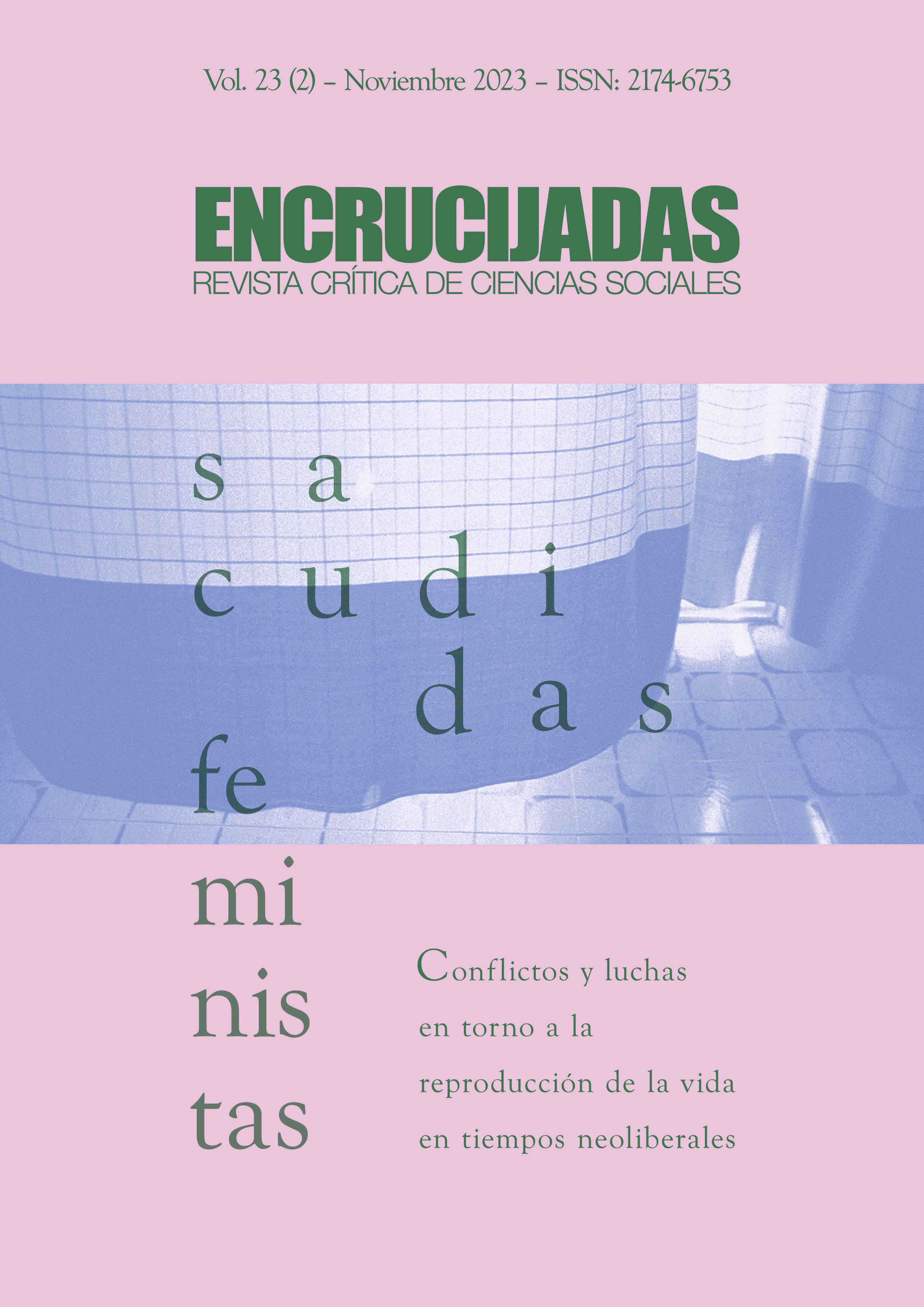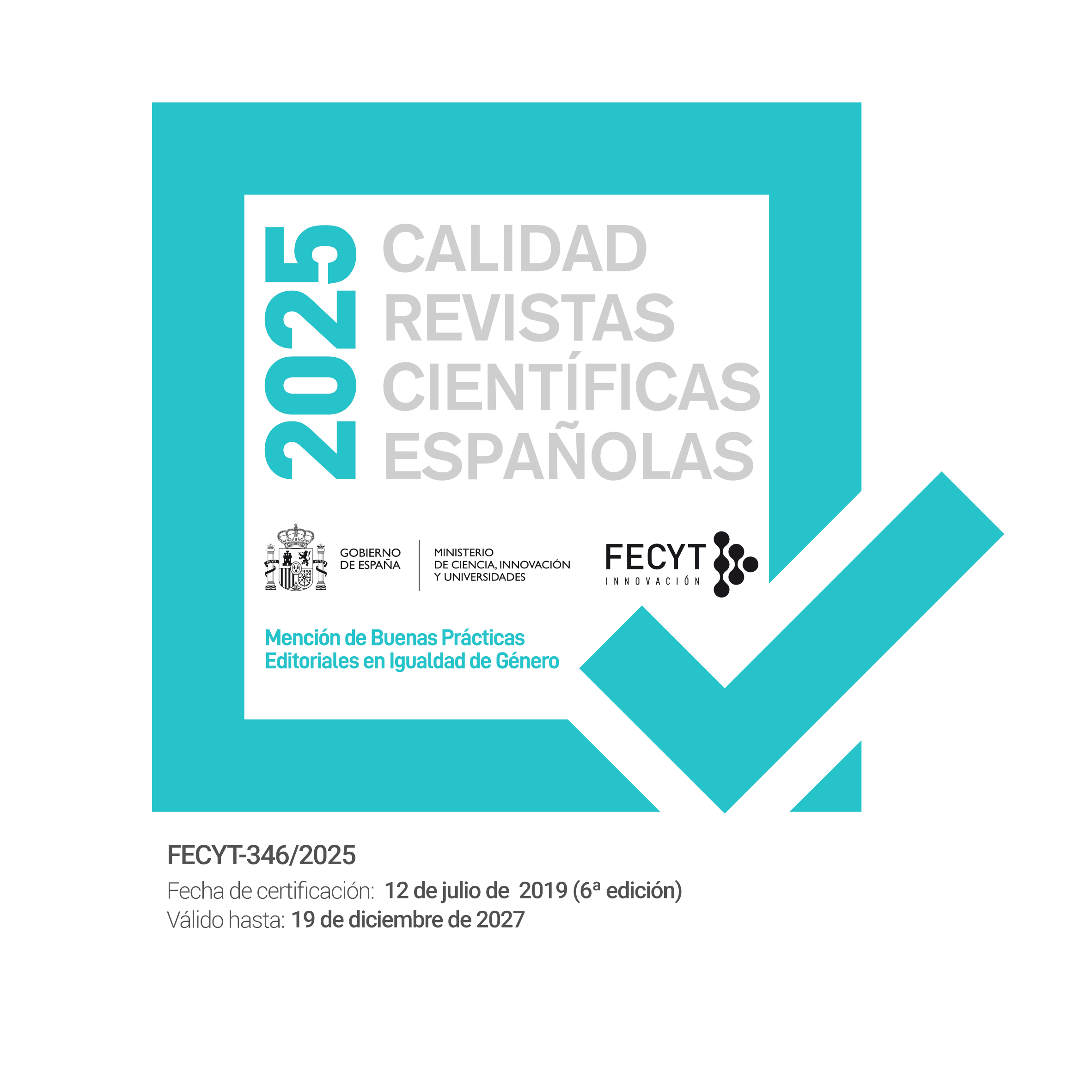La reproducción de la nación en el discurso de la derecha radical española: un análisis de la agenda natalista de Vox (2019-2022)
Palabras clave:
derecha radical, nacionalismo de género, natalismo, antifeminismo, biopolíticaResumen
El artículo explora el marco discursivo de Vox sobre la “crisis demográfica” como representante de la derecha radical en España desde una perspectiva de género. Se trata de un estudio cualitativo realizado a partir del análisis de contenido de intervenciones parlamentarias de miembros de esta formación en el Congreso de los Diputados en el periodo 2019-2022. Los principales hallazgos apuntan a la construcción de un estado de “pánico demográfico” nativista para la promoción de políticas natalistas que garanticen la supervivencia nacional. La familización explícita, mediante incentivos económicos y fiscales, y la limitación de derechos sexuales y reproductivos son las dos principales estrategias propuestas para incentivar la natalidad española. Desde una perspectiva biopolítica, las mujeres son definidas como reproductoras de la nación, situándolas en una posición de subordinación respecto a la familia “natural” y al Estado. Esta instrumentalización antifeminista del cambio demográfico puede dar lugar a un “efecto contagio” a los partidos mainstream, influyendo en las políticas dirigidas a minorías sexuales y/o étnicas, incrementando la polarización ideológica y repercutiendo en la calidad de la democracia (democratic backlash).
Descargas
Citas
Abou-Chadi, Tarik y Krause Werner (2018). The Causal Effect of Radical Right Success on Mainstream Parties Policy Positions: A Regression Discontinuity Approach. British Journal of Political Science, 50(3), 1–19. https://doi.org/10.1017/S0007123418000029.
Akkerman, Tirse (2015). Gender and the radical right in Western Europe: a comparative analysis in policy agendas. Patterns and Prejudice, 49(1-2), 37-60. https://doi.org/10.1080/0031322X.2015.1023655.
Anduiza, Eva y Guillem Rico (2022). Sexism and the far-right vote: the individual dynamics of gender backlash. American Journal of Political Science, 0(0), 1-16. https://doi.org/10.1111/ajps.12759.
Balinhas, Daniel (2020). Populismo y nacionalismo en la “nueva” derecha radical española. Pensamiento al margen, 13, 69-88.
Cabezas, Marta (2022). Patriarchal Authoritarianism Reloaded: Gender Violence, Policy Conflict, and the Resurgence of the Far Right in Spain. Polar, 45(1), 56-76. https://doi.org/10.1111/plar.12484.
Cabezas, Marta; Alexandre Pichel y Begonya Enguix (2023). El marco “antigénero” y la (ultra)derecha española. Grupos de discusión con votantes de Vox y del Partido Popular. Revista de Estudios Sociales, 85(7), 97-114. https://doi.org/10.7440/res85.2023.06.
Catalano-Weeks, Ana y Peter Allen (2022). Backlash against “identity politics”: far right success and mainstream party attention to identity groups. Politics, Groups, and Identities. https://doi.org/10.1080/21565503.2022.2065318
Cheddadi, Zakariae y José Manuel León (2022). Selectividad étnica en el discurso migratorio de Vox: entre el pragmatismo y el esencialismo. Papers, 107(1), 61-87. https://doi.org/10.5565/rev/papers.2930.
Cornejo, Mónica y José Ignacio Pichardo (2017). La “ideología de género” frente a los derechos sexuales y reproductivos. El escenario español. Cadernos Pagu, (50)- http://dx.doi.org/10.1590/18094449201700500009.
Enggist, Matthias y Michael Pinggera (2021). Radical Right Parties and Their Welfare State Stances – Not so Blurry after All? West European Politics. https://doi.org/10.1080/01402382.2021.1902115.
Ennser, Laurenz (2022). The impact of radical right parties on family benefits. West European Politics, 45(1), 154-176. https://doi.org/10.1080/01402382.2021.1936944.
Farris, Sara (2017). In the name of women’s rights: The rise of femonationalism. Duke University Press.
Federici, Silvia (2004). Calibán y la bruja: mujeres, cuerpo y acumulación primitiva. Traficantes de sueños.
Ferreira, Carles (2019). Vox como representante de la derecha radical en España: un estudio sobre su ideología. Revista Española de Ciencia Política, 51, 73-98. https://doi.org/10.21308/recp.51.03.
Foster, Russell D. y Xander Kirke (2022). ‘Straighten Up and Fly Right’: Radical Right attempts to appeal to the British LGBTQ+ community. The British Journal of Politics and International Relations. https://doi.org/10.1177/13691481211069346.
Herek, Gregory M. (2015). Beyond “homophobia”: Thinking about sexual prejudice and stigma in the twenty-first century. Sexuality Research and Social Policy, 12(3), 162-171. https://doi.org/10.1525/srsp.2004.1.2.6.
Jaureguiberry, Ximena S. y Jorgelina B. Farré (2020). Biopolítica, subjetividad y derechos. Una mirada sociohistórica sobre el aborto. ConCienciaSocial, 4(7), 181-195.
Kováts, Eszter y Maari Põim (2015). Gender as symbolic glue: the position and role of conservative and far right parties in the antigender mobilizations in Europe. Friedrich-Ebert-Stiftung.
Meardi, Guglielmo y Igor Guardiancich (2022). Back to the familialist future: the rise of social policy for ruling populist radical right parties in Italy and Poland, West European Politics, 45(1), 129-153. https://doi.org/10.1080/01402382.2021.1916720.
Millar, Erica (2015). ‘Too many’: Anxious white nationalism and the biopolitics of abortion. Australian Feminist Studies, 30(83), 82-98. https://doi.org/10.1080/08164649.2014.998457.
Moreno, Salvador y José Miguel Rojo (2021). La construcción del enemigo en los discursos de la derecha radical europea: un análisis comparativo. Encrucijadas, 21(2), a2112. https://recyt.fecyt.es/index.php/encrucijadas/article/view/88217
Morland, Paul (2014). Demographic Engineering: Population Strategies in Ethnic Conflict. Routledge.
Mudde, Cas (2019). The Far Right Today. Polity Press.
Neale, Joanne (2016). Iterative categorization (IC): a systematic technique for analyzing qualitative data. Addiction, 111(6), 1096-1106. https://doi.org/10.1111/add.13314.
Newth, George (2022). Populism and nativism in contemporary regionalist and nationalist politics: a minimalist framework for ideologically opposed parties. Politics, 0(0). https://doi.org/10.1177/0263395721995016.
Ortiz, Pablo; Antonia María Ruiz y Manuel Tomás González (2020). El caso español y sus implicaciones para el estudio de la ultraderecha: antecedentes y nuevas estrategias de investigación. Revista de Estudios Políticos, 188, 199-220. https://doi.org/10.18042/cepc/rep.188.07.
Pérez Díaz, Julio (2019). Duración de la vida, natalidad y migraciones en España. Ekonomiaz, 96(2), 53-79.
Puar, Jasbir K. (2007). Terrorist assemblages: homonationalism in queer times. Duke University Press.
Rodríguez-Muñiz, Michael (2021). Figures of the Future: Latino Civil Rights and the Politics of Demographic Change. Princeton University Press.
Saldaña, Johnny (2013). The Coding Manual for Qualitative Researchers. Sage.
Snow, David A. y Robert D. Benford (1992). Master frames and cycles of protest. En A. Morris y C. Mueller (Eds.), Frontiers in Social Movement Theory (pp. 133-155). Yale University Press.
Spierings, Niels; Marcel Lubbers y Andrej Zaslove (2017). ‘Sexually modern nativist voters’: do they exist and do they vote for the populist radical right? Gender and Education, 29(2), 216-237, https://doi.org/10.1080/09540253.2016.1274383.
Vila-Henninger, Luis Antonio (2019). Turning talk into “rationales”: using the extended case method for coding and analysis of semi-structured interview date in ATLAS.ti. Bulletin de Méthodologie Sociologique, 143, 28-52. https://doi.org/10.1177/0759106319852887.
Weissman, Anna L. (2017). Repronormativity and the reproduction of the nation-state: the state and sexuality collide. Journal of GLBT Family Studies, 13(3), 277-305, http://dx.doi.org/10.1080/1550428X.2016.1210065.
Wodak, Ruth (2015). The politics of fear. What right-wing populist discourses mean. Sage.
Yuval-Davis, Nira (1993). Gender and Nation. Ethnic and Racial Studies, 16(4), 621-622.
Yuval-Davis, Nira (1996). Women and the biological reproduction of “the nation”. Women’s Studies International Forum, 19(1-2), 17-24.
Descargas
Publicado
Cómo citar
Número
Sección
Licencia
Derechos de autor 2023 Encrucijadas. Revista Crítica de Ciencias Sociales

Esta obra está bajo una licencia internacional Creative Commons Atribución-NoComercial-SinDerivadas 4.0.
Los autores/as conservan los derechos de autor y ceden a la revista el derecho de la primera publicación, con el trabajo registrado con la licencia de atribución de Creative Commons Reconocimiento-NoComercial (CC-BY 4.0), que permite a terceros utilizar lo publicado siempre que mencionen la autoría del trabajo y a la primera publicación en esta revista. Encrucijadas permite y se anima a todas las personas autoras a depositar la versión final publicada en repositorios institucionales o temáticos de acceso abierto, cumpliendo en caso necesario los términos establecidos por la entidad financiadora de la investigación.





